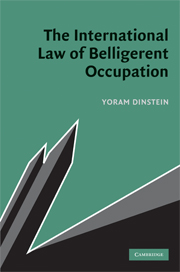Book contents
- Frontmatter
- Contents
- Preface
- Table of cases
- Table of treaties
- Table of UN Resolutions
- List of abbreviations
- 1 The general framework
- 2 The legal nature and basic principles of belligerent occupation
- 3 Human rights and belligerent occupation
- 4 The maintenance of law and order in occupied territories
- 5 Legislation by the Occupying Power
- 6 The judicial system in occupied territories
- 7 Protection of the civilian population under belligerent occupation
- 8 Special protection in occupied territories
- 9 Destruction and pillage of property in occupied territories
- 10 Seizure and use of property in occupied territories
- 11 Other major issues relating to belligerent occupation
- 12 The termination of belligerent occupation
- Conclusion
- Index of persons
- Index of subjects
Conclusion
Published online by Cambridge University Press: 24 January 2011
- Frontmatter
- Contents
- Preface
- Table of cases
- Table of treaties
- Table of UN Resolutions
- List of abbreviations
- 1 The general framework
- 2 The legal nature and basic principles of belligerent occupation
- 3 Human rights and belligerent occupation
- 4 The maintenance of law and order in occupied territories
- 5 Legislation by the Occupying Power
- 6 The judicial system in occupied territories
- 7 Protection of the civilian population under belligerent occupation
- 8 Special protection in occupied territories
- 9 Destruction and pillage of property in occupied territories
- 10 Seizure and use of property in occupied territories
- 11 Other major issues relating to belligerent occupation
- 12 The termination of belligerent occupation
- Conclusion
- Index of persons
- Index of subjects
Summary
688. If there is a lodestar guiding the law of belligerent occupation, it is the principle that the civilian population of an occupied territory must benefit from maximal safeguards feasible in the circumstances. The protection of the civilian population is the key concern of relevant international legal norms, whether they are engendered by custom or by treaty. This means that life and order in the occupied territory must not be destabilized, let alone reach a vanishing point. The authority of the Occupying Power is not untrammelled. Primarily, the Occupying Power is barred from three d's: it is not allowed to despoil resources, destroy property (in a context that exceeds military operations) or deport the local inhabitants.
689. All the same, it would be wrong to think that the interests of the Occupying Power are ignored or trampled over by the law of belligerent occupation. As in other branches of LOIAC, humanitarian considerations (while of the utmost importance) are liable to be trumped by countervailing requirements of military necessity. In particular, although the Occupying Power fails to acquire sovereignty over the occupied territory, it need not brook forcible opposition to its continued effective control over the area. The military government can mobilize and employ all the power available to it (within the limits imposed by LOIAC) in order to quell organized resistance or individual acts of sabotage.
690. Belligerent occupation bristles with tantalizing problems derived from a combustible situation that is in many respects unique.
- Type
- Chapter
- Information
- The International Law of Belligerent Occupation , pp. 286 - 287Publisher: Cambridge University PressPrint publication year: 2009



